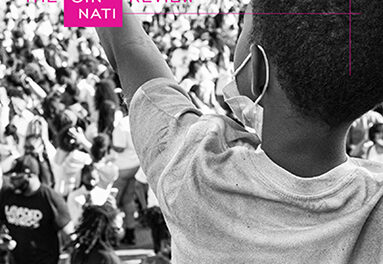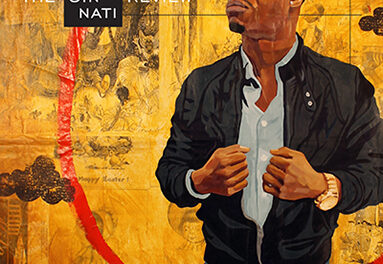Our train broke down in the frozen heart of the taiga. At first we were startled. We had grown accustomed to the relentless presence of the engine, the way that it throbbed beneath our toes and thrummed through our veins. When we tried to rise, we stumbled and then tried again.
How strange it was to find that now, after thousands of miles and more, our world was standing still.
We didn’t need windows (our car didn’t have them) to know that it had started snowing. We had felt the pressure of the sky buckle and release. We heard the flakes slicing through air as thin as silk, hissing when they fell against tracks that were still warm. We imagined the snow twirling like trapeze artists, twinkling like their sequined skirts.
The car door slid open a crack, the cold white wind twisted forward, and the girls were blown inside. Their faces were jumbles of bones beneath matted hoods, their eyes too wide for their skulls. To us, they were lovely and strange. The fair one tossed a handful of frozen currants between the bars of our cage. The dark one hung back.
“You’ve stained your mittens,” the dark one said.
“I don’t care,” said the fair one. We knew she didn’t. “Who is here to see them?”
No one, we rumbled in reply, feeling a sudden urge to stretch, to yawn. We composed our faces into what we hoped was a look of genuine human warmth. No one is here but us.
(We couldn’t say, later, when our sense of foreboding began. Was it before the train stopped, or after?)
When the engineer passed by our car, we listened to the crunch of his boots on packed snow. He told the conductor that the supplies he needed to fix the engine were sitting in a factory five hundred miles ahead of us, in Saint Petersburg, where we were due for a performance in a few days’ time.
“Whoever heard of a frozen train?” the fair girl asked her friend. Her sister? We couldn’t tell. Everyone without fur looked so much alike: fragile and bare.
The dark one crossed her arms. We could see the sharp angle of her elbows even through her blankets. “They say that we’re not the only ones,” she said. “It’s happening all up and down the lines. The cold puts cracks in the engine.” She paused. “And if it’s not the engine that stops the train,” she added, “it’s the revolutionaries.”
The word fell off her tongue, weighty and delicate. Revolutionaries.
In each place the train had stopped over the past several months, we encountered an intensifying stench of fear and unrest. We could see humans surging through the streets, weaving between carriages and trolleys. Often, as we lumbered from the train to the ring for one of our shows, the chains rattling between our legs, we were followed by crowds, trailed by hungry, yearning faces. Their buildings loomed behind them, the walls caked with soot and the rooms packed with still more bodies. On the edges of the larger cities, factories spat black smoke into the clouds. Even at midday, everything felt dark.
“What do they want?” the fair girl asked the dark one, time and again. Her voice trembled, and we smelled her fear.
The answer was always the same. “Peace,” the dark one would say. “Land. Bread.”
(Our mothers had told us a story once about a bear who befriended two little girls. Did you think that only humans had these tales?)
…





